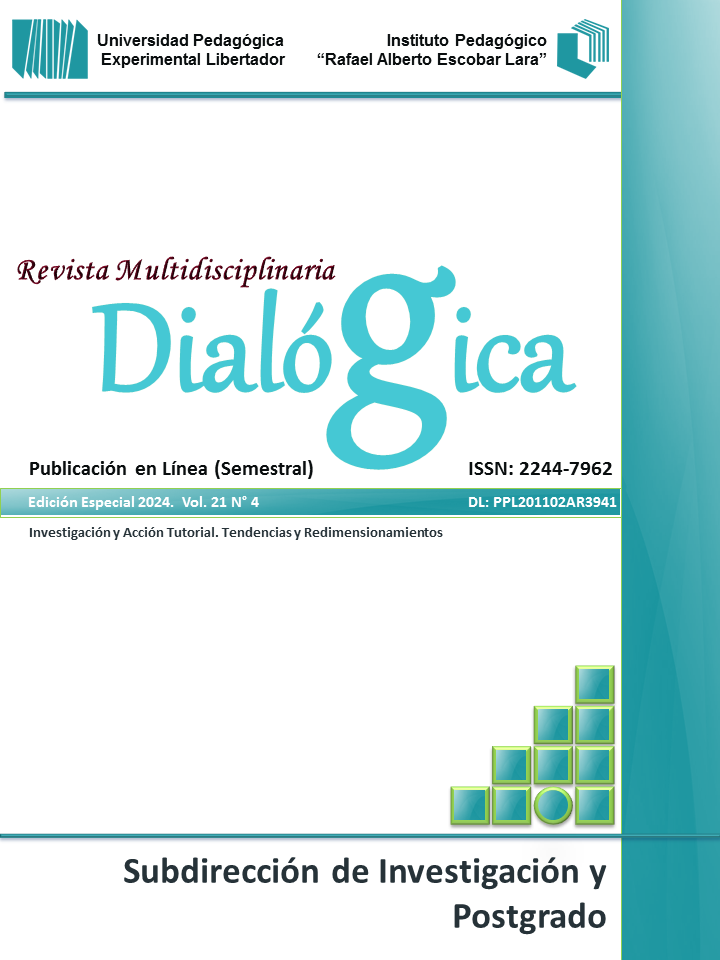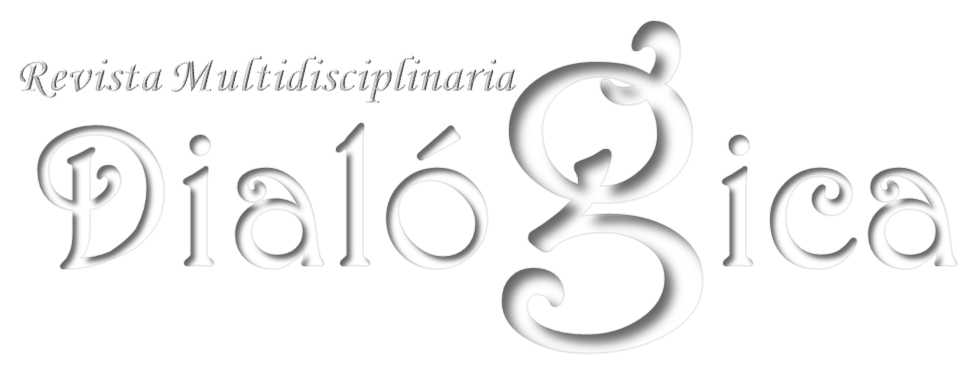TUTORIAL TRAINING FROM THE DEVELOPMENT OF RESEARCH SKILLS AND COMPARATIVE METHODOLOGY IN LATIN AMERICA
DOI:
https://doi.org/10.56219/dialgica.v21i4.3312Keywords:
Investigative skills, tutorial training, digital skills, comparative methodologyAbstract
Tutorial training in Latin America is carried out in various ways. The purpose of this research is to generate a theoretical approach to tutorial training from the development of investigative skills and comparative methodology in Latin America. This research has Lakatos (1983) and Chevallard (1998) as essential theoretical references. The research was developed from the heuristic method with the application of semi-structured interviews and the survey from the measurement of investigative competencies in the tutor-student-seminar teacher generating triads. The process of deconstruction, construction, de-comprehension, understanding, relationship and contrast of the information is based on the benefits of the technologies in its SPSS and Atlas Ti software, in such a way that the systematization and the networks that are interwoven allowed us to draw the tutorial training in Latin America from the development of investigative skills as a synapse between foreign knowledge and generated knowledge.
References
Altamirano, M., y Martínez, A. (2020). El método comparado como componente metodológico en las políticas públicas. Revista de Investigaciones Universidad del Quindío, 32(2), 88-101. https://doi.org/10.33975/riuq.vol32n2.455 DOI: https://doi.org/10.33975/riuq.vol32n2.455
Chevallard, Y. (1998). La Transposición didáctica. Del saber sabio al saber enseñado (3a. ed.). Aique Grupo Editor.
Cupare, O., y Resplandor, G. (2023). Estrategias didácticas para el desarrollo de competencias investigativas en estudiantes universitarios. Prohominum, 5 (1), 126–143. https://doi.org/10.47606/ACVEN/PH0175 DOI: https://doi.org/10.47606/ACVEN/PH0175
Kino, J., Vidaurre, W., Silva, J., y Lloclla, H. (2023). Herramientas tecnológicas y competencias investigativas en estudiantes universitarios. Revista Venezolana de Gerencia, 28 (Edición Especial 10), 1610-1630. https://doi.org/10.52080/rvgluz.28.e10.45 DOI: https://doi.org/10.52080/rvgluz.28.e10.45
Macías, M., Lago, D., Lago, C., y Aguilera, J. (2020). Análisis de necesidades de formación continua de directores de tesis para la tutoría de estudiantes de doctorado. Caso de la Universidad de Cartagena de Indias. Acta Hispánica. II: 867-87. https://doi.org/10.14232/actahisp.2020.0.867-874 DOI: https://doi.org/10.14232/actahisp.2020.0.867-874
Páez, X., y Samaniego, R. (2021). Imre Lakatos. Los programas de investigación científica. Revista de Investigación y Desarrollo Científico. Honoris Causa, Universidad de Yacambú, 13 (1). https://revista.uny.edu.ve/ojs/index.php/honoris-causa/article/view/47/66
Peñaloza de Lara, A. (2018). Competencias cognitivas del docente (tutor) en la guía u orientación investigativa para la producción de la tesis doctoral: Edición Semestral. Revista Plus Economía, 6(1), 10–16. https://revistas.unachi.ac.pa/index.php/pluseconomia/article/view/31
Quintana, J. (2022). Importancia del Tutor para la Calidad Académica de la Tesis de Grado: Recomendaciones desde el Enfoque por Competencias. Orbis Tertius - UPAL, 6(12), 37–50. https://doi.org/10.59748/ot.v6i12.122 DOI: https://doi.org/10.59748/ot.v6i12.122
Ríos, P., Ruiz, C., Paulos, T., y León, R. (2023). Desarrollo de una escala para medir competencias investigativas en docentes y estudiantes universitarios. Areté, Revista Digital Del Doctorado En Educación, 9(17), 147–169. DOI: https://doi.org/10.55560/arete.2023.17.9.7 DOI: https://doi.org/10.55560/ARETE.2023.17.9.7
Tapia, C., Cardona, S., y Vázquez, H. (2018). Las competencias investigativas en posgrado: experiencia de un curso en línea. Revista Espacios. 39(53). http://www.revistaespacios.com/cited2017/cited2017-20.pdf
Tapullima, C.,Livia, J., Pizzán, N., Pizzán, S., Iñipe, M., Saenz, A., y Gómez, F. (2023). Propiedades psicométricas de las escalas de competencias investigativas: una revisión sistemática. Propósitos y Representaciones, 11(3), e1868. https://doi.org/10.20511/pyr2023.v11n3.1868 DOI: https://doi.org/10.20511/pyr2023.v11n3.1868
Downloads
Published
How to Cite
Issue
Section
License
Copyright (c) 2024 Maroslee Díaz Guillen

This work is licensed under a Creative Commons Attribution-NonCommercial-ShareAlike 4.0 International License.


 @revistadialogica
@revistadialogica DialogicaUPEL
DialogicaUPEL RevistaDialogicaUPELMaracay
RevistaDialogicaUPELMaracay dialógicaupel@gmail.com
dialógicaupel@gmail.com dialogicaupel.blogspot.com
dialogicaupel.blogspot.com https://issuu.com/dialogicaupel
https://issuu.com/dialogicaupel https://revistas.upel.edu.ve/index.php/dialogica/
https://revistas.upel.edu.ve/index.php/dialogica/









